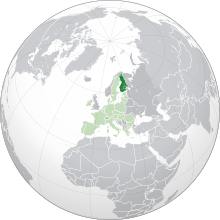
Back تاريخ اليهود في فنلندا Arabic Židé ve Finsku Czech Historia de los judíos en Finlandia Spanish Suomen juutalaiset Finnish Histoire des Juifs en Finlande French יהדות פינלנד HE Storia degli ebrei in Finlandia Italian Евреи в Финляндии Russian Židia vo Fínsku Slovak Judar i Finland Swedish
This article may require copy editing for grammar, style, cohesion, tone, or spelling. (February 2023) |
 The location of Finland (dark green) in the European Union (light green) | |
| Total population | |
|---|---|
| 1,650[1] | |
| Regions with significant populations | |
| Helsinki (80% of the Finnish Jewish community), Turku (13%), Tampere (3%)[1] | |
| Languages | |
| Finnish, Swedish, Hebrew, Yiddish, German, Russian[2] | |
| Religion | |
| Judaism | |
| Related ethnic groups | |
| Ashkenazi Jews: notably Russian Jews, Ukrainian Jews, and others. |
The history of the Jews in Finland goes back to the 1700s. The country is home to some 1,800 Jews, of which 1,400 live in the Greater Helsinki area and 200 in Turku.[1] Most Jews in Finland have Finnish or Swedish as their mother tongue, and many speak Yiddish, German, Russian and Hebrew.[2] Jews originally came to Finland as Russian soldiers who stayed in Finland in the 19th century after their military service ended (known as Cantonists).[1] There are Jewish congregations in Helsinki and Turku with their own synagogues built in 1906 and 1912. The Wiborg Synagogue built 1910–1911 was destroyed in air bombings during the first day of the Winter War on 30 November 1939.[1] Since data collection began in 2008, incidents of antisemitism have been on the rise in Finland.[3] The number of incidents are likely under-reported as Finland does not account for specific forms of hate speech that incite violence or hatred.[4]
- ^ a b c d e "Short History of Finnish Jewry". Jewish Community of Helsinki. Retrieved 5 November 2020.
- ^ a b Arnö, Kaj (2 November 2020). "About language and the Jews of Finland". Projekt Fredrika r.f. Retrieved 5 November 2020.
- ^ "Antisemitism: Overview of antisemitic incidents recorded in the European Union 2011–2021". European Union Agency for Fundamental Rights. 3 November 2022. Retrieved 1 October 2023.
- ^ "Fundamental Rights Report 2022, p. 87-88". European Union Agency for Fundamental Rights. 8 June 2022. Retrieved 1 October 2023.
© MMXXIII Rich X Search. We shall prevail. All rights reserved. Rich X Search